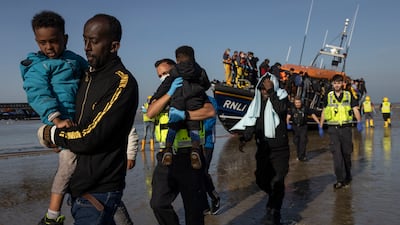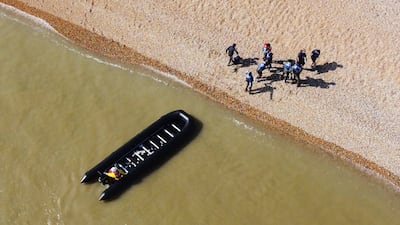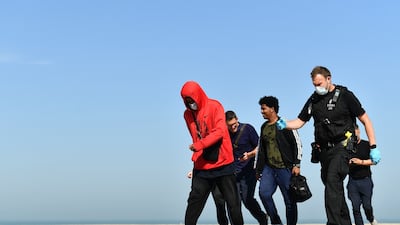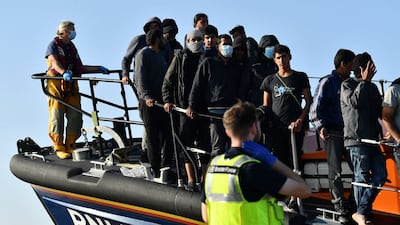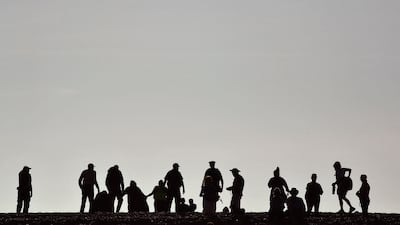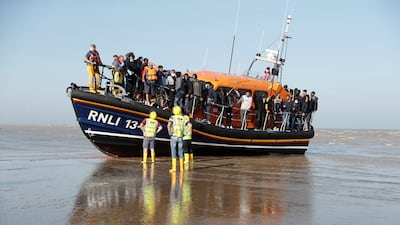France warned the UK that it would not be blackmailed into guiding migrant boats back to its shores after London ordered the UK’s Border Force to turn around vessels in the English Channel.
France’s Interior Minister Gerald Darmanin took to Twitter to publicly rebuke Britain over its proposal during an ongoing row over the issue.
UK Home Secretary Priti Patel has instructed senior law officers to rewrite Britain’s interpretation of international maritime law to allow for boats to be intercepted.
The proposal would allow a ship's captain to judge whether a vessel should be turned around as it attempts to enter UK territorial waters. The move also relies on a French vessel responding to a UK message, although the government in Paris has rejected any role in supporting the policy.
More than 1,500 migrants are estimated to have entered the UK illegally this week and Ms Patel is threatening to withhold £54 million ($74.4m) in funding if the French do not take further action to discourage Channel crossings.
Mr Darmanin tweeted: “France will not accept any practice contrary to the law of the sea, nor any financial blackmail.
“Great Britain's commitment must be kept. I made it clear to my counterpart @pritipatel.
“The friendship between our two countries deserves better than postures which harm co-operation between our services.”
In a letter to Ms Patel, Mr Darmanin said pushback tactics would have “a negative impact on our co-operation”, The Times reported.
Mr Darmanin rejected Britain’s request to set up a joint command centre in northern France that would include police and border control officers from both countries patrolling the coastline and the Channel.
The pair discussed the migrant issue at a meeting of G7 interior ministers in London yesterday but failed to reconcile differences.
Ms Patel told her counterpart that the British public “expect to see results” from French efforts to prevent continued migrant crossings.
Sky News reported that the Home Office has been working for months to train Border Force officers to divert migrant boats back into the remit of the French coastguard.
Minister for Social Care Helen Whately said ministers were “looking at all the options”, pointing out that migrants undertaking the crossings were embarking on a journey that is “desperately dangerous”.
“Of course we should look at all the options and do what’s best," she said.
“And I think the really important thing here is the work we’re doing with the French and to support the French to actually stop people leaving in the first place.
“We want to deter people from embarking on that kind of dangerous journey.”
She said that every migrant on board a boat “puts money into people smugglers’ pockets, those organised international crime gangs”.
Reports suggest the practice of pushing migrant boats back to France is likely to apply only to sturdier, bigger vessels and used only in “very limited circumstances”, a government source told the BBC.
“We do not routinely comment on maritime operational activity,” a Home Office representative said.
Prime Minister Boris Johnson said on Wednesday that efforts to stop the crossings depended “to a large extent” on the ability and co-operation of the French authorities.
Dan O’Mahoney, clandestine Channel threat commander, said efforts so far have prevented more than 10,000 migrant attempts, led to about 300 arrests and secured 65 convictions.
Charities urged the Home Office to take a “more humane and responsible approach” to asylum seekers and said humanitarian visas were needed to help “prevent the chaos of the Channel crossings”.
In an interview with BBC Radio 4’s Today programme on Thursday, Lucy Morton, professional officer for the ISU, the union for borders, immigration and customs, said British authorities could not send a vessel back if it is “in any way vulnerable”.
“Vulnerability is not defined just by the state of the vessel, it is also defined by the individuals inside that vessel,” she said.
She said the pushback tactics could only be used if the French co-operated with the Border Force because under international maritime rules any boat turned back in the Channel must be received by a French vessel.
Such pushback tactics are used by Frontex, the European border and coastguard agency, in the Mediterranean with the help of the Libyan Navy, she said.
Illegal migration is expectd to be high on the agenda for the final day of the G7 meeting on Thursday.
A former first sea lord and chief of the naval staff expressed scepticism about the policy, saying “playing games about pushing boats back” would create problems for Britain.
Lord West, who led the Royal Navy from 2002 to 2006, predicted the policy to be “highly problematic”.
Speaking to the BBC’s World At One programme, he stressed he “can understand people’s annoyance” but “the only way to actually change this is if we get an agreement with France”.
He said in order for the push back tactics to be used, British authorities would have to ensure migrants landed safely back on French shores, something which they could not guarantee without the cooperation of Paris.
He added that “the French at the moment are not being easy about this”, and said: “This is highly dangerous. People forget how dangerous the sea is and it’s flat, calm and people have been coming across but it doesn’t take much suddenly for people to go into the water and drown.
“And when you start playing games about pushing ships back and pushing boats back, that is, as I say, it’s highly problematic. Very, very difficult to do.”
A top French coast guard also poured cold water on Ms Patel’s proposal, saying it would put lives at risk.
Asked whether the French coastguard could intercept boats heading for UK waters, Philippe Dutrieux replied: "Given the amount of activity, our resources are almost entirely taken up by all the rescue missions.
"And if we don't do it (interventions), it's also because of the very serious risk associated with these over-loaded vessels, with women and children.
"Approaching a vessel to bar its way would mean running the risk of causing people to move on board, of a panicked movement, which would add further risk to a situation that is already extremely dangerous... "What's most important is saving lives," he added.
Mr Dutrieux said there had been 15,400 attempted crossings up to August 31 this year, a rise of 50 percent from the whole of last year.
